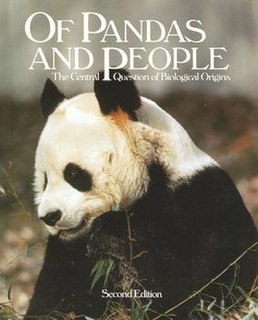Related Research Articles

Creationism is the religious belief that nature, and aspects such as the universe, Earth, life, and humans, originated with supernatural acts of divine creation. In its broadest sense, creationism includes a continuum of religious views, which vary in their acceptance or rejection of scientific explanations such as evolution that describe the origin and development of natural phenomena.

Intelligent design (ID) is a pseudoscientific argument for the existence of God, presented by its proponents as "an evidence-based scientific theory about life's origins". Proponents claim that "certain features of the universe and of living things are best explained by an intelligent cause, not an undirected process such as natural selection." ID is a form of creationism that lacks empirical support and offers no testable or tenable hypotheses, and is therefore not science. The leading proponents of ID are associated with the Discovery Institute, a Christian, politically conservative think tank based in the United States.

Irreducible complexity (IC) is the argument that certain biological systems cannot have evolved by successive small modifications to pre-existing functional systems through natural selection, because no less complex system would function. Irreducible complexity has become central to the creationist concept of intelligent design, but the scientific community regards intelligent design as pseudoscience and rejects the concept of irreducible complexity. Irreducible complexity is one of two main arguments used by intelligent-design proponents, alongside specified complexity.

The Discovery Institute (DI) is a politically conservative non-profit think tank based in Seattle, Washington, that advocates the pseudoscientific concept of intelligent design (ID). It was founded in 1990 as a non-profit offshoot of the Hudson Institute.
University College London, which operates as UCL, is a major public research university located in London, United Kingdom. UCL is a member institution of the federal University of London, and is the second-largest university in the United Kingdom by total enrolment and the largest by postgraduate enrolment.

John Stephen Jones is a British geneticist and from 1995 to 1999 and 2008 to June 2010 was Head of the Department of Genetics, Evolution and Environment at University College London. His studies are conducted in the Galton Laboratory. He is also a television presenter and a prize-winning author on the subject of biology, especially evolution. He is a popular contemporary writer on evolution. In 1996 his work won him the Michael Faraday Prize "for his numerous, wide ranging contributions to the public understanding of science in areas such as human evolution and variation, race, sex, inherited disease and genetic manipulation through his many broadcasts on radio and television, his lectures, popular science books, and his once-regular science column in The Daily Telegraph and contributions to other newspaper media".

Michael J. Behe is an American biochemist, author, and advocate of the pseudoscientific principle of intelligent design (ID). He serves as professor of biochemistry at Lehigh University in Pennsylvania and as a senior fellow of the Discovery Institute's Center for Science and Culture. Behe is best known as an advocate for the validity of the argument for irreducible complexity (IC), which claims that some biochemical structures are too complex to be explained by known evolutionary mechanisms and are therefore probably the result of intelligent design. Behe has testified in several court cases related to intelligent design, including the court case Kitzmiller v. Dover Area School District where his views were cited in the ruling that intelligent design is not science and is religious in nature.

The intelligent design movement is a neo-creationist religious campaign for broad social, academic and political change to promote and support the pseudoscientific idea of intelligent design (ID), which asserts that "certain features of the universe and of living things are best explained by an intelligent cause, not an undirected process such as natural selection." Its chief activities are a campaign to promote public awareness of this concept, the lobbying of policymakers to include its teaching in high school science classes, and legal action, either to defend such teaching or to remove barriers otherwise preventing it. The movement arose out of the creation science movement in the United States, and is driven by a small group of proponents.

Stephen C. Meyer is an American author and former educator. He is an advocate of the pseudoscience of intelligent design and helped found the Center for Science and Culture (CSC) of the Discovery Institute (DI), which is the main organization behind the intelligent design movement. Before joining the DI, Meyer was a professor at Whitworth College. Meyer is a Senior Fellow of the DI and Director of the CSC.

Of Pandas and People: The Central Question of Biological Origins is a controversial 1989 school-level supplementary textbook written by Percival Davis and Dean H. Kenyon, edited by Charles Thaxton and published by the Texas-based Foundation for Thought and Ethics (FTE). The textbook endorses the pseudoscientific concept of intelligent design – the argument that life shows evidence of being designed by an intelligent agent which is not named specifically in the book, although proponents understand that it refers to the Christian God. The overview chapter was written by young Earth creationist Nancy Pearcey. They present various polemical arguments against the scientific theory of evolution. Before publication, early drafts used cognates of "creationist". After the Edwards v. Aguillard Supreme Court ruling that creationism is religion and not science, these were changed to refer to "intelligent design". The second edition published in 1993 included a contribution written by Michael Behe.

The Kansas evolution hearings were a series of hearings held in Topeka, Kansas, United States from May 5 to 12, 2005 by the Kansas State Board of Education and its State Board Science Hearing Committee to change how evolution and the origin of life would be taught in the state's public high school science classes. The hearings were arranged by the Board of Education with the intent of introducing intelligent design into science classes via the Teach the Controversy method.

Kitzmiller v. Dover Area School District, 400 F. Supp. 2d 707 was the first direct challenge brought in the United States federal courts testing a public school district policy that required the teaching of intelligent design, ultimately found by the court to not be science. In October 2004, the Dover Area School District of York County, Pennsylvania, changed its biology teaching curriculum to require that intelligent design be presented as an alternative to evolution theory, and that Of Pandas and People, a textbook advocating intelligent design, was to be used as a reference book. The prominence of this textbook during the trial was such that the case is sometimes referred to as the Dover Panda Trial, a name which recalls the popular name of the Scopes Monkey Trial in Tennessee, 80 years earlier. The plaintiffs successfully argued that intelligent design is a form of creationism, and that the school board policy violated the Establishment Clause of the First Amendment to the United States Constitution. The judge's decision sparked considerable response from both supporters and critics.
UCL Medical School is the medical school of University College London (UCL) and is located in London, United Kingdom. The School provides a wide range of undergraduate and postgraduate medical education programmes and also has a medical education research unit and an education consultancy unit. It is internationally renowned and is currently ranked 8th in the world by the QS World University Rankings 2020.

"A Scientific Dissent from Darwinism" was a statement issued in 2001 by the Discovery Institute, a conservative think tank based in Seattle, Washington, U.S., best known for its promotion of the pseudoscientific principle of intelligent design. As part of the Discovery Institute's Teach the Controversy campaign, the statement expresses skepticism about the ability of random mutations and natural selection to account for the complexity of life, and encourages careful examination of the evidence for "Darwinism", a term intelligent design proponents use to refer to evolution.

Truth in Science is a United Kingdom-based creationist organisation which promotes the Discovery Institute's "Teach the Controversy" campaign, which it uses to try to get pseudoscientific intelligent design creationism taught alongside evolution in school science lessons. The organisation claims that there is scientific controversy about the validity of Darwinian evolution, a view rejected by the United Kingdom's Royal Society and over 50 Academies of Science around the world. The group is affiliated with the Discovery Institute, the hub of the intelligent design movement, following its strategy and circulating the Institute's promotional materials.

This timeline of intelligent design outlines the major events in the development of intelligent design as presented and promoted by the intelligent design movement.

The relationship between intelligent design and science has been a contentious one. Intelligent design (ID) is presented by its proponents as science and claims to offer an alternative to evolution. The Discovery Institute, a politically conservative think tank and the leading proponent of intelligent design, launched a campaign entitled "Teach the Controversy" which claims that a controversy exists within the scientific community over evolution. The scientific community, however, rejects intelligent design as a form of creationism. The basic facts of evolution are not a matter of controversy in science.
References
- ↑ "Michael Reiss - UCL Institute of Education, University College London" . Retrieved 15 January 2015.
- 1 2 "Michael Reiss: How to convert a generation," The Guardian , 28 November 2006.
- ↑ "Prof Michael Jonathan Reiss" . Crockford's Clerical Directory (online ed.). Church House Publishing . Retrieved 31 May 2021.
- 1 2 Who's Who, 2009
- ↑ Kroto, Harry (28 September 2008). "Blinded by a divine light". The Guardian. Retrieved 12 May 2016.
- ↑ "'Creationism' biologist quits job". BBC News . 16 September 2008. Retrieved 16 September 2008.
- ↑ Sample, Ian (16 September 2008). "Reiss resigns over call to discuss creationism in science lessons". The Guardian. Retrieved 12 May 2016.
- ↑ "International Journal of Science Education, editorial board". Taylor and Francis. 2008. Retrieved 19 September 2008.
- ↑ Press Release: "No change in Society's position on creationism," Royal Society, 12 September 2008.
- 1 2 "Call for Creationism in Science," BBC, 13 September 2008.
- ↑ For example, "Leading scientist urges teaching of creationism in schools," TimesOnline, 12 September 2008.
- ↑ Reiss on-line blog posting: "Science lessons should tackle creationism and intelligent design," The Guardian , 11 September 2008.
- ↑ "Today: Tuesday 28 July 2009". BBC News. 28 July 2009. Retrieved 12 May 2010.
- ↑ "Unbelievable? 27 Nov 2010 - Mike Behe & Michael Reiss audience debate on ID". 27 November 2010. Retrieved 12 May 2016.